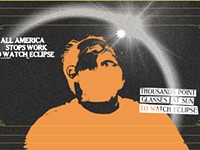Woman sues Rochester police, claims she miscarried due to tear gas exposure
By Gino Fanelli @GinoFanelli
Police converge on City Hall on Sept. 16, 2020, in response to demonstrators "occupying" the exterior of the building.
[
{
"name": "500x250 Ad",
"insertPoint": "5",
"component": "15667920",
"parentWrapperClass": "",
"requiredCountToDisplay": "1"
}
]
A Rochester woman is suing the city of Rochester, the Rochester Police Department, and Monroe County, claiming she suffered a miscarriage after officers used tear gas to disperse a crowd during the social justice protests of 2020.
The lawsuit was filed Friday in state Supreme Court on behalf of Jesse Ames, 35, who the filings said was a participant in a protest on Sept. 4, 2020. That night, police officers used a tactic known as “kettling” to confine protesters on the Court Street bridge, and then used tear gas to drive protesters eastward, away from the Monroe County Public Safety Building.
The lawsuit alleges Ames became trapped on the bridge and was forced to inhale chemical agents including tear gas.
“Suddenly, without giving the protesters the time or opportunity to disperse—and knowing it was physically impossible for them to comply with the dispersal orders—law enforcement officers began violently attacking protesters,” the lawsuit reads. “In fact, the RPD officers began indiscriminately firing pepper balls into the crowd less than 30 seconds after the first ‘dispersal’ order was issued at approximately 10:43 p.m.”
As a result of the incident, Ames claims to have suffered skin irritation and a miscarriage. She later had to undergo a dilation and curettage (D&C) procedure to remove fetal tissue from her uterus, the lawsuit filings said.
Ames is represented by Elliot Shields, an attorney with New York City-based Roth & Roth; and Don Thompson of Easton Thompson Kasperek Shiffrin. Thompson and Shields have, between the two of them, filed some two-dozen federal lawsuits related to the protests of 2020, most of which are ongoing.
A request for the comment from the city of Rochester was not immediately returned.
Reached by phone, Shields said Ames decided to file a lawsuit upon hearing of the other lawsuits alleging injury during the protests.
“They used those canisters of tear gas knowing that they can cause harm to the reproductive system, I mean, it’s written right on the side of the canisters,” Shields said.
Researchers have not directly established whether tear gas can cause spontaneous abortion, otherwise known as a miscarriage. But they have found evidence that there may be a link between exposure to tear gas — particularly 2-chlorobenzylidene malononitrile, better known as CS gas — and miscarriages.
For example, a 2016 study that examined the use of tear gas around the world noted a number of symptoms that can arise from exposure, most commonly skin rashes of varying severity. The study also noted that “circumstantial reports suggest a correlation between CS exposure and miscarriage.”
Researchers have also suggested a link between tear gas exposure and abnormal menstrual cycles.
A 2020 study following racial justice protests in Portland, Oregon, found that of 899 people who menstruate, or 54.5 percent of respondents, experienced symptoms such as increased menstrual cramping, increased bleeding, abnormal spotting, and longer periods.
In September 2020, WXXI reported on claims from several women who said they were exposed to tear gas during the Rochester protests and subsequently experienced abnormal menstrual cycles and symptoms, such as cramping.
While noting a statistical connection, neither study concluded an exact physiological connection between CS gas and the reproductive system.
Shields acknowledged that Ames’s case is complex, but he noted the Rochester Police Department’s recent policy shift banning the use of tear gas for any purpose. He said the change was a tacit acknowledgement of the risk the chemicals pose.
“I think that’s a good thing, they’re acknowledging that these things are dangerous” Shields said. “...They should’ve known.”
The lawsuit cites several news articles that reported on the connection between exposure to tear gas and reproductive system issues. The lawsuit also alleges officers ignored warnings printed on the canisters themselves.
“More importantly, the chemical weapons that defendants used against Ms. Ames and other protesters came with warnings that stated that the chemical weapons were known to cause reproductive and developmental toxicity,” the lawsuit reads. “In other words, defendants knew that the chemical weapons had the potential risk to adversely affect fertility and offspring development.”
In New York, a person has three years to file a lawsuit if they sustained injury. Ames is seeking unspecified damages in the lawsuit.
Gino Fanelli is a CITY staff writer. He can be reached at (585) 775-9692 or [email protected].
The lawsuit was filed Friday in state Supreme Court on behalf of Jesse Ames, 35, who the filings said was a participant in a protest on Sept. 4, 2020. That night, police officers used a tactic known as “kettling” to confine protesters on the Court Street bridge, and then used tear gas to drive protesters eastward, away from the Monroe County Public Safety Building.
The lawsuit alleges Ames became trapped on the bridge and was forced to inhale chemical agents including tear gas.
“Suddenly, without giving the protesters the time or opportunity to disperse—and knowing it was physically impossible for them to comply with the dispersal orders—law enforcement officers began violently attacking protesters,” the lawsuit reads. “In fact, the RPD officers began indiscriminately firing pepper balls into the crowd less than 30 seconds after the first ‘dispersal’ order was issued at approximately 10:43 p.m.”
As a result of the incident, Ames claims to have suffered skin irritation and a miscarriage. She later had to undergo a dilation and curettage (D&C) procedure to remove fetal tissue from her uterus, the lawsuit filings said.
Ames is represented by Elliot Shields, an attorney with New York City-based Roth & Roth; and Don Thompson of Easton Thompson Kasperek Shiffrin. Thompson and Shields have, between the two of them, filed some two-dozen federal lawsuits related to the protests of 2020, most of which are ongoing.
A request for the comment from the city of Rochester was not immediately returned.
Reached by phone, Shields said Ames decided to file a lawsuit upon hearing of the other lawsuits alleging injury during the protests.
“They used those canisters of tear gas knowing that they can cause harm to the reproductive system, I mean, it’s written right on the side of the canisters,” Shields said.
Researchers have not directly established whether tear gas can cause spontaneous abortion, otherwise known as a miscarriage. But they have found evidence that there may be a link between exposure to tear gas — particularly 2-chlorobenzylidene malononitrile, better known as CS gas — and miscarriages.
For example, a 2016 study that examined the use of tear gas around the world noted a number of symptoms that can arise from exposure, most commonly skin rashes of varying severity. The study also noted that “circumstantial reports suggest a correlation between CS exposure and miscarriage.”
Researchers have also suggested a link between tear gas exposure and abnormal menstrual cycles.
A 2020 study following racial justice protests in Portland, Oregon, found that of 899 people who menstruate, or 54.5 percent of respondents, experienced symptoms such as increased menstrual cramping, increased bleeding, abnormal spotting, and longer periods.
In September 2020, WXXI reported on claims from several women who said they were exposed to tear gas during the Rochester protests and subsequently experienced abnormal menstrual cycles and symptoms, such as cramping.
While noting a statistical connection, neither study concluded an exact physiological connection between CS gas and the reproductive system.
Shields acknowledged that Ames’s case is complex, but he noted the Rochester Police Department’s recent policy shift banning the use of tear gas for any purpose. He said the change was a tacit acknowledgement of the risk the chemicals pose.
“I think that’s a good thing, they’re acknowledging that these things are dangerous” Shields said. “...They should’ve known.”
The lawsuit cites several news articles that reported on the connection between exposure to tear gas and reproductive system issues. The lawsuit also alleges officers ignored warnings printed on the canisters themselves.
“More importantly, the chemical weapons that defendants used against Ms. Ames and other protesters came with warnings that stated that the chemical weapons were known to cause reproductive and developmental toxicity,” the lawsuit reads. “In other words, defendants knew that the chemical weapons had the potential risk to adversely affect fertility and offspring development.”
In New York, a person has three years to file a lawsuit if they sustained injury. Ames is seeking unspecified damages in the lawsuit.
Gino Fanelli is a CITY staff writer. He can be reached at (585) 775-9692 or [email protected].
Latest in News
More by Gino Fanelli
-

DeWolf Brewing Company set to open in Victor
Apr 26, 2024 -

These small cannabis farmers say New York's legal weed rollout is ruining their lives
Mar 21, 2024 -

Man shakes fist at sun
Mar 15, 2024 - More »






